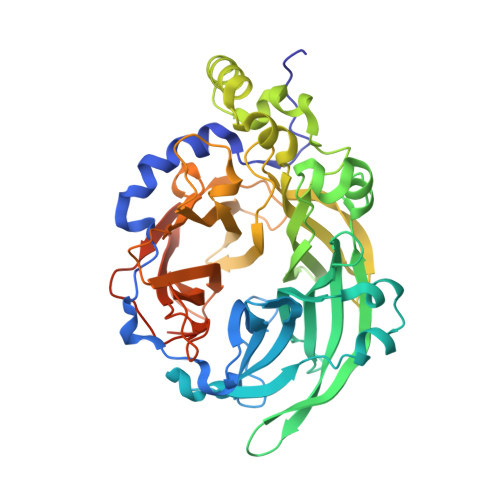Implications of the mutation S164A on Bacillus subtilis levansucrase product specificity and insights into protein interactions acting upon levan synthesis.
Ortiz-Soto, M.E., Porras-Dominguez, J.R., Rodriguez-Alegria, M.E., Morales-Moreno, L.A., Diaz-Vilchis, A., Rudino-Pinera, E., Beltran-Hernandez, N.E., Rivera, H.M., Seibel, J., Lopez Munguia, A.(2020) Int J Biol Macromol 161: 898-908
- PubMed: 32553967
- DOI: https://doi.org/10.1016/j.ijbiomac.2020.06.114
- Primary Citation of Related Structures:
6PWQ - PubMed Abstract:
Mutation S164A largely affects the transfructosylation properties of Bacillus subtilis levansucrase (SacB). The variant uses acceptors such as glucose and short levans with an average molecular weight of 7.6 kDa more efficiently than SacB, leading to the enhanced synthesis of medium and high molecular weight polymer and a blasto-oligosaccharide series with a polymerization degree of 2-10. A 3-fold increase in blasto-oligosaccharides yield is provoked by the modified interplay between the variant and glucose. Despite its modified product specificity, protein-carbohydrate and protein-protein interactions are still a major factor affecting size and distribution of levan molecular weight. This study highlights the importance of critical factors such as protein concentration in the analysis of wild-type and mutagenized levansucrases. Docking experiments with the crystal structures of SacB and variant S164A - the latter obtained at a 2.6 Å resolution - identified unreported potential binding subsites for fructosyl moieties on the surface of both enzymes.
- Institut für Organische Chemie, Julius-Maximilians-Universität, Am Hubland, 97074 Würzburg, Germany.
Organizational Affiliation:




















